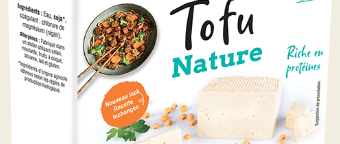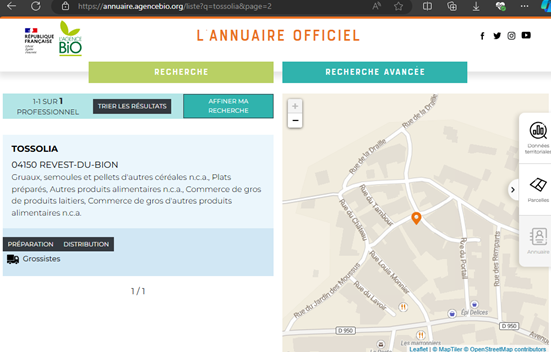Food Certification Case Study: Organic French Tofu
7/13/20244 min read


Tossolia is a company based in Revest-du-Bion, Alpes-de-Haute-Provence, France, which produces plant-based food products including tofu, seitan burger patties, and plant-based steaks.
The company’s products hold the twin labels of AB (‘agriculture biologique’, or organic farming) which label is under the purview of the French Ministry of Agriculture and Food, as well as, by transposition, the European logo ('Eurofeuille' or Euroleaf).
What does the certification mean?
The AB certification identifies products which are either 100% organic or, in the case of processed products, comprise at least 95% organic agricultural components (MASA 2023). Unprocessed agricultural products include cereals, vegetables, fruits, flowers used for ornamental purposes, cotton, milk, eggs, and animals; processed products include bread, cheese, and ready-made meals (MEFSIN 1).
As for the Euroleaf, it can be applied to a product where (1) it has been produced in accordance with the rules of the official control and certification system, and (2) its packaging bears the name of the producer, preparer or distributor and the approval number of the certification body (INAO).
Tossolia states that it works solely with products deriving from organic farming and without GMOs (Tossolia 2024).
What requirements are included?
Organic farming practices refer to those based on sustainable agricultural management which preserves the quality of natural resources and ecosystems such as soil, air, and water, and adopt cultivation practices which both respect natural equilibria and impose a limited impact on the environment (MASA 2023).
For a product to be considered organic, the following conditions must be satisfied: (1) no synthetic chemicals (i.e. pesticides, fertilizers, weed killers, etc.) or genetically modified organisms must have been used in its production, and (3) production practices must respect animal welfare (in terms of transport, breeding conditions, slaughter, and so on) (MEFSIN 2023). Food irradiation, synthetic chemical colours and flavours, flavour enhancers, and most additives are also prohibited (MEFSIN 2023).
Only products containing at least 95% certified organic agricultural ingredients may include the terms "organic" or "organic" in their sales name. Products which do not satisfy the requirements may state the word "organic" in their lists of ingredients but not in their sales names (MEFSIN 1).
How are these practices checked?
The National Institute of Origin and Quality (‘INAO’) is responsible for implementation and monitoring compliance with AB-related laws and regulations, including the approval of certifying bodies (MASA).
Organic food production, processing, storage and distribution operators (“operators”) are inspected at least once annually by certifying bodies approved by the French government (MASA). The INAO also has oversight over the activities of the certifying bodies themselves (INAO).
All operators must also notify their activity to Agence française pour le développement et la promotion de l'agriculture biologique (“L’Agence Bio”), which maintains a directory of recognized organic operators (DGCCRF).
Tossolia appears on L’Agence Bio's directory:
(Image: Tossolia)


What critiques have there been related to this certification?
Consumer choice - which appears to be directed primarily by environmental and health concerns (Terre-net 2023) - may be muddied by the plethora of labels which could appear on the same product. Such competing labels include as the High Environmental Value ('Haute Valeur Environnementale') ('HVE') label, which also pertains to organic products but primarily in terms of environmental excellence (MASA 2016), or the Nutriscore label which categorizes a product's nutritional content from A (most recommended) to E (least).
The organic certification has been described as less precise and informative than competing labels, such as those which explicitly proclaim the absence of pesticides, sulphites, or nitrites (Terre-net 2023).
AB standards have also been criticized for being designed in and for industrialized countries, which could lead to the exclusion of producers located in areas (for example in French overseas territories) in which the agricultural sector remains less industrially developed (Temple and de Bon 2020). These standards could therefore create and sustain a technocentric understanding of organic farming which precludes, in the case of some African countries, traditional existing family-based organic agroecological systems (Temple and de Bon 2020).
References:
Direction générale de la concurrence, de la consommation et de la répression des frauds ('DGCCRF'). 'Agriculture biologique'. https://www.economie.gouv.fr/dgccrf/Publications/Vie-pratique/Fiches-pratiques/Agriculture-biologique
L'Institut national de l'origine et de la qualité ('INAO'). 'Agriculture biologique'. https://www.inao.gouv.fr/Les-signes-officiels-de-la-qualite-et-de-l-origine-SIQO/Agriculture-biologique
Ministère de l'Agriculture et de la Souveraineté Alimentaire ('MASA'). (2016). 'Bio et Haute Valeur Environnementale : deux modes de valorisation complémentaires'. 26 May 2016. https://agriculture.gouv.fr/bio-et-haute-valeur-environnementale-deux-modes-de-valorisation-complementaires
MASA (2023). 'La certification en agriculture biologique'. 6 Jun 2023. https://agriculture.gouv.fr/la-certification-en-agriculture-biologique
Ministère de l'Economie des Finances et da la Souveraineté Industrielle et Numérique ('MEFSIN') 1. 'Agriculture biologique'. https://www.economie.gouv.fr/dgccrf/Publications/Vie-pratique/Fiches-pratiques/Agriculture-biologique
MEFSIN (2023). 'Labels bios: comment vous y retrouver?' 30 Nov 2023. https://www.economie.gouv.fr/particuliers/comprendre-labels-bios#
Temple, L. and de Bon, H. (2020). L’agriculture biologique : controverses et enjeux globaux de développement en Afrique. Cah. Agric. 2020, 29, 3. https://doi.org/10.1051/cagri/2020002 https://agritrop.cirad.fr/595132/1/Agri-Bio-Temple-Debon-2020.pdf
Terre-net. 'Pourquoi la bio marque-t-elle le pas en France?' 29 Jun 2023. https://www.terre-net.fr/agriculture-biologique/article/841767/pourquoi-la-bio-marque-t-elle-le-pas-en-france. Accessed 13 Jul 2024.
Tossolia. (2024). ‘Rapport RSE 2024’. https://www.tossolia.fr/wp-content/uploads/2024/06/rapport-rse-2024.pdf
Image credits: Tossolia (https://www.tossolia.fr/produits/tofu-nature/); L’Agence BIO (Liste des opérateurs bio (agencebio.org)) (accessed on 13 Jul 2024)
(Image: L'Agence Bio)